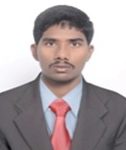
SCIENTIST (Plant Bio-technology)
Crop Improvement

SCIENTIST (Plant Bio-technology)
Crop Improvement

Scientist (Genetics and Plant Breeding)
Crop Improvement
Details of Employment:
| S. No. | Name of Institute | Designation | Posted |
| 1 | ICAR-Central Soil Salinity Research Institute, Karnal | Scientist (Genetics and Plant Breeding) | 19-04-2024 to Till date |
| 2 | ICAR-Central Soil Salinity Research Institute, Regional Research Station, Canning Town | Scientist (Genetics and Plant Breeding) | 04-04-2020 to 17-04-2024 |
| 3 | ICAR-National Academy of Agricultural Research Management, Hyderabad | Scientist (on Probation) | 07-01-2020 to 03-04-2020 |
Education:
| Degree | Class/Grade | University/Board/Inst. | Year |
| B.Sc.(Agriculture) | 1st / 9.31/10.0 | TNAU, Coimbatore | 2014 |
| M.Sc.(Genetics) | 1st / 8.36/10.0 | IARI, New Delhi | 2016 |
| Ph.D.(Genetics & Plant Breeding) | 1st (Distinction) / 8.42/10 | IARI, New Delhi | 2022 |
Current Area of Research:
Research Projects:
Ongoing (In-house): 1
Ongoing (Externally Funded): 2
Completed (In-house): 1
Particulars of prizes/medals/scholarships in academic field
Training Attended: (9) –Five Recent
Professional recognition:
| Membership of Professional Societies | ||
| Life Member | Indian Society of Genetics and Plant Breeding, New Delhi | 2020 |
| Life Member | Indian Society of Plant Breeders, Coimbatore | 2021 |
| Life Member | Indian Society of Coastal Agricultural Research, Canning | 2021 |
| Life Member | Indian Society of Soil Salinity and Water Quality, Karnal | 2021 |
| Members of Executive Council | Indian Society of Coastal Agricultural Research, Canning | 2023 |
| Member of Editorial Board | ||
| Section Editor | Journal of Indian Society of Coastal Agricultural Research | 2021 |
| Section Editor (Crop Science) | Food and Scientific Reports – a monthly multidisciplinary technical electronic magazine | 2020 |
| Review Editor | Frontiers in Nutrition | 2022 |
List of publications
Research paper (12): Best five
Review Paper (7): Best two
Book published: 1
Number of Popular Article published: 11
Number of conference/symposia attended: 13

Scientist (Genetics and Plant Breeding)
Crop Improvement
Working on Breeding for Salinity and sodicity tolerance in Rice and Cotton, associated with different intra and inter Institutional Projects of ICAR.
| SL.No | Publications |
| Research Articles | |
| 1. | Lokeshkumar B M and Patil B R., 2018. Estimation of genetic variability parameters in F2 population of Gossypium hirsutum L. for yield, yield attributes and fiber quality traits. Int.J.Curr.Microbiol.App.Sci, 7(9): 360-367. |
| 2 | Lokeshkumar B M and Niranjana Murthy, 2017. Genetic variability and divergence studies for yield component traits in grain amaranth (Amaranthus spp.). Int.J.Curr.Microbiol.App.Sci, 6(12): 1276-1285. |
| 3 | Krishnamurthy S. L., Preeti Pundir, Arvinder S. Warraich, Suman Rathor, Lokeshkumar B M, Nagendra K. Singh and Parbodh C. Sharma, 2020. Introgressed Saltol QTL lines improves the salinity tolerance in rice at seedling stage. Front. Plant Sci. doi: 10.3389/fpls.2020.00833.
|
| 4. | Y. S. Muralidhara, B. M. Lokeshkumar, G. Uday and J. Shanthala., 2015. Studies on genetic variability, correlation and path analysis of seed yield and related traits in green gram [Vigna radiata L. Wilczek]. International Journal of Agricultural Science and Research, 5(3): 125-132.
|
| 5. | Y. S. Muralidhara, B. M. Lokeshkumar, G. Uday and J. Shanthala., 2015. Intergeneration correlation and narrow-sense heritability between F2and F3 generations for yield components in green gram [Vigna radiata L. Wilczek]. International Journal of Agricultural Science and Research, 5(4): 357-362.
|
| Short communication | |
| 1 | B. M. Lokeshkumar, Niranjana Murthy, Y. S. Muralidhara and B. R. Mani., 2014. Genetic variability for physiological, growth and yield traits in grain amaranth (amaranthus spp. L.). Proceedings of National Symposium on Crop Improvement for Inclusive Sustainable Development, held at PAU, Ludhiana. 537-539. |
| Popular articles | |
| 1. | Y. S. Muralidhara, B. M. Lokeshkumar, N. V. Mohan Kumar, P. G. Suresha and M. C. Anjali., 2015 Crop modeling and its application in Plant Breeding. Agrobios Newsletter. 14(6): 80-81. |
| 2. | M. C. Anjali, N. V. Mohan Kumar, P. G. Suresha, B. M. Lokeshkumar and Y. S. Muralidhara., 2016. Plant microbial strategies for increasing phosphorus use efficieny. Agrobios Newsletter. 14(8): 32-33. |
| 3. | N. V. Mohan Kumar, B. M. Lokeshkumar, P. G.Suresha, M. C. Anjali and Y. S. Muralidhara., 2016.SAGE Technology. Agrobios Newsletter. 14(9): 72-73. |
| 4. | P. G. Suresha, N. V. Mohan Kumar, M. C. Anjali, Y. S. Muralidhara and B. M. Lokeshkumar., 2015.Importance of reporter gene. Agrobios Newsletter. 14(10): 78-79. |
| Abstracts | |
| .1 | BM Lokeshkumar, SL Krishnamurthy, Suman Rathor and PC Sharma , 2019, Evaluation of Rice Landraces of for Salinity Tolerance at Seedling Stage. Golden Jubilee International Salinity Conference held at ICAR-CSSRI Karnal Haryana India. p140. |
| 2 | H. Mahesh, B. R. Patil, K. P. Raghavendra, J. Vrinda and B. M. Lokeshkumar, 2017. De navo assembly of cotton (Gossypium hirsutum) transcriptome for fibre quality using illumines sequencing for gene discovery and marker identification. National conference on plant breeding in genomics era held at UAS Bengaluru. p3. |
| 3. | H. Mahesh, B. R. Patil, J. Vrinda and B. M. Lokeshkumar, 2017.RNA sequence based QTL mapping and genetic investigation for fibre strength in Gossypium hirsutum L. . National conference on plant breeding in genomics era held at UAS Bengaluru. p20. |
| 4. | J. Vrinda, B. R. Patil, K. P. Raghavendra, B. M. Lokeshkumar and H. Mahesh, 2017. Transcriptome sequencing and comparative analysis of differentially expressed genes for fibre quality in cotton. National conference on plant breeding in genomics era held at UAS Bengaluru. p48. |
| 5. | M. C. Anjali, N. V. Mohan Kumar, B. M. Lokeshkumar and Gadad Veeranna., 2015. Influence of environmental changes on Pole bean (Phaseolus vulgaris L.) yield and farmer’s income in south Karnataka. National seminar on Climate Change and Agrarian Economy: An Indian Perspective held at UAS, Dharwad. p161. |
| 6 | M. C. Anjali, B. M. Lokeshkumar, N. V. Mohan Kumar and Gadad Veeranna., 2015. Effect of high night temperature on growth and yield and its mitigation strategies. National seminar on Climate Change and Agrarian Economy: An Indian Perspective held at UAS, Dharwad. p162. |
| 7. | M. C. Anjali, N. V. Mohan Kumar, B. M. Lokeshkumar and Gadad Veeranna., 2015. Impact of high temperature on reproductive phase and seed yield. National seminar on Climate Change and Agrarian Economy: An Indian Perspective held at UAS, Dharwad. p162. |
| 8. | M. C. Anjali, B. M. Lokeshkumar, N. V. Mohan Kumar and Gadad Veeranna., 2015. Conventional, Biotechnological and Nano-Technological strategies for crop improvement under rapidly changing climatic conditions. National seminar on Climate Change and Agrarian Economy: An Indian Perspective held at UAS, Dharwad. p200. |
| 9. | M. C. Anjali, N. V. Mohan Kumar, Gadad Veeranna and B. M. Lokeshkumar., 2015. Development of cultivars for elevated atmospheric Co2 through selection of desirable Co2 enriched plants. National seminar on Climate Change and Agrarian Economy: An Indian Perspective held at UAS, Dharwad.p201. |
| 10. | H. Lokesh, B. R. Patil, B. M. Lokeshkumar and H. N. Nethravathi., 2016. Molecular basis and evaluation of cytoplasmic male sterile based hybrids of pigeonpea (Cajanus cajana (L.) Millsp.). National seminar on Genetics and Cytogenetics held at at UAS, Dharwad. p155. |

PRINCIPAL SCIENTIST
Crop Improvement
| Name |
|
||
| Date & Place of Birth | 11.02.1966 (Firozabad UP) | ||
| Nationality | Indian | ||
| Field of specialization | Plant Breeding | ||
| Present Position/Designation | Principal Scientist | ||
| Tel. No | 0184-2209327 | ||
| Cell | 9315382163 | ||
| Tel. No (R) | 0184-2280502
|
||
| kulshreshthan@yahoo.com; neeraj.kulshreshtha@icar.gov.in | |||
| Address Official | Division of Crop Improvement, ICAR-Central Soil salinity Research Institute, Karnal 132001 | ||
| Address Residential | A 502 Palm Residency, Sector 35, Karnal 132001 |
Academic career and professional attainments
| (a) Degree | University/Institution | Year |
| Graduation | Punjabi University Patiala
Bio, Phy, Chem, Eng |
1982
Ist, 443/650 68% |
| Masters M.Sc (Ag) Plant Breeding | GBPUAT Pantnagar | 1987
Ist, 4.866/5.0 |
| Ph.D. (Plant Breeding) | GBPUAT Pantnagar | 1992
Ist, 4.709/5.0 UGC JRF/SRF |
| Post Graduate Diploma in Human Resource Management
|
IGNOU, NEW DELHI, | 1998 |
| (b) Position held | Institution | Period of appointment |
| Scientist (Rs. 8,000- 13,500) | ICAR-NAARM Hyderabad | 21-07-1993 to 18-12-1993 |
| Scientist (Rs. 8,000- 13,500) | ICAR-IIWBR (DWR) Karnal (Attachment) | 19-12-1993 to 22.08.1994 |
| Scientist (Rs. 8,000- 13,500) | ICAR-IISR Lucknow | 23.08.1994 to 20.07.1998 |
| Scientist (Sr Scale) | ICAR-IISR Lucknow | 21.07.1998 to 20.07.2002 |
| Sr Scientist (Rs. 12,000- 18,300) | ICAR-IISR Lucknow | 21.07.2002 to 28.07.2003 |
| Sr Scientist (Rs. 12,000- 18,300) | ICAR-CSSRI Karnal | 29.07.2003 to 31.12.2005 |
| Sr Scientist (Rs 37400-67000
Grade Pay 9000) |
ICAR-CSSRI Karnal | 01.01.2006 to 31.12.2008 |
| Principal Scientist (Rs 37400-67000 Grade Pay 10000) | ICAR-CSSRI Karnal | 01.01.2009 to 02.11.2014 |
| Principal Scientist & Head (Rs (37400-67000 Grade Pay 10000) | ICAR- Sugarcane Breeding Institute, regional center Karnal
132001 |
03.11.2014 to 11.03.2020 |
| Principal Scientist & Head Crop Improvement (A) (Rs (37400-67000 Grade Pay 10000) | ICAR CSSRI Karnal | 24.03.2020-till date |
Varieties developed
| 1 | Salt tolerant wheat variety KRL 210 Gazette Notified by the CVRC and recognized at national level (As PI)
Released by CVRC Notified in 2012 Govt of India notification no. S.O. 456 (E) dated March, 16th, 2012 Registered with PPVFRA with registration no. 816 of 2014 issued on December 23, 2014. National identity number IC 574474 by NBPGR vide letter no. Cons/RV/4125 |
| 2 | Salt tolerant wheat variety KRL 213 Gazette Notified by the CVRC and recognized at national level (As PI)
Released by CVRC Notified in 2011 Govt of India notification no. S.O. 2326 (E) dated October 10th, 2011. National identity number IC 574475 by NBPGR vide letter no. Cons/RV/4125. Registered with PPVFRA with registration no. 654 of 2014 issued on October 15, 2014. |
| 3 | Salt tolerant wheat variety KRL 283 Gazette Notified by the CVRC for salt affected areas of UP (As PI)
Approved in 79th meeting of Central Sub Committee on crop standards, notification and release of varieties for Agricultural crops (CVRC) in January 2018. Notified vide gazette notification S.O. 1379(E) dated 27.03.2018 |
| 4 | Sugarcane variety Co 12029 (Karan 13) released 2019
Notified vide gazette notification S.O.1498 (E) dated 01.04.2019 Approved in 81st meeting of Central Sub Committee on crop standards, notification and release of varieties for Agricultural crops (CVRC) vide o/o no. 3-70/2018-SD.IV dated 19.02.2019 |
| 5 | Sugarcane Variety CoLk 9709 released for UP State 2012 – Early maturing high yielding sugarcane variety |
| Genetic Stocks Registered at NBPGR | |
| 1 | KRL 99 (Wheat) Salt and waterlogging tolerance
Registration number INGR 07046 of NBPGR |
| 2 | KRL 3-4 (Wheat) Salt and waterlogging tolerance
Registration number INGR 09087 of NBPGR |
Patents:
Patent granted for “QUATRO SUGARCANE SINGLE BUD CUTTER” CUTTING TOOLS AND IMPLEMENTS” on 12/06/2019 (Design reference no. 297432 dated 03-Jul-2017)
Technologies/concepts:
Externally Funded Projects
| Title | (PI/CoPI/Associate) | Budget (Rs. in lakhs) | Sponsoring Agency |
| Wheat Improvement for waterlogging, salinity and element toxicities in Australia and India
|
PI | Aus $ 1210143
CSSRI Component: Rs 52.3 lakh (Aus $ 248180)
|
ACIAR, Australia |
| Multilocation evaluation of wheat germplasm”
|
PI | Rs 19,00197/=
Expenditure incurred upto 2014 |
ICAR through NBPGR |
| Improvement of wheat for salt tolerance using molecular approach | PI | 54.62 lakhs | ICAR Network project |
| Physiological and Genetic Approaches for the Development of Waterlogging Tolerance in Wheat on Sodic/ Alkaline and Neutral Soils in India And Australia | Co PI | Rs 24,67,255/= | Australian Centre for International Agricultural Research (ACIAR), Australia |
| Using genomics and mapping approaches to improve tolerance of crop plants to salinity stress | Co PI | 5.31 lakhs | DST funded for CP-STIO |
| Physiological approaches for winter ratooning management in Sugarcane under subtropical conditions | Co PI | 100 lakhs | RKVY |
| Healthy seed production and mechanization of sugarcane agriculture_ A farmers participatory initiative Funding from RKVY Haryana – Approved | Co PI | 175.5 lakhs | RKVY |
| Healthy seed production and quality jaggary production towards increasing sugarcane farmers income- An Institute, Industry and Farmers participatory initiative
Funding from RKVY Haryana – Approved |
Co PI | 313.5 lakhs | RKVY |
| Sugarcane breeder seed production and demonstration of intercropping
|
PI | 1620000
|
NFSM
|
Recognition at the National Level
Foreign visits
| Place of visit | Duration | Purpose |
| International Rice Research institute, Los Banos, Laguna, Philippines
|
24.11.2008 to 5.12.2008 December 8-10, 2008 | Training on “Marker Assisted selection (MAS) in Rice: Theory, Practice and application”
Training on “Hands-on Training on Screening Rice Genotypes for Salinity Tolerance” |
| Australia | 28.09.2011 to 23.10.2011 | Deputed as
1.Visiting scientist to DAFWA Australia (Sep 28, 2011 to October 8, 2011) CSSRI O/O No. 4(7)/CSSRI/2310 dated 3, Aug, 2011 and CSSRI O/O No. 4(7)/E-1/2009/3786-94 dated 27.09.2011. Visited waterlogging screening trials at Katanning, salinity tolerance trials at Ballidu, attended field trials at Albany and Merreden. Worked on doubled haploid production in wheat with Dr Sue Broughton 2.Visiting scientist to University of Adelaide , Australia (October 9-October 15, 2011) CSSRI O/O No. 4(7)/CSSRI/2310 dated 3, Aug, 2011 and CSSRI O/O No. 4(7)/E-1/2009/3786-94 dated 27.09.2011. Visited ICP facilities at UA. Visited Experimental fields at Kalpanda, Merildrin, Redhill and James Town, Visited Angus Valley and Murray Valley |
| Kathmandu, Nepal | September 10-14, 2014. | Invited to deliver keynote address on “Wheat breeding for salt affected soils: current status and options” on 12.09.2014 during 6th CSISA Annual research and workplan meeting. |
Publications :36
Books Authored : 2
Books Edited : 8


Senior SCIENTIST (Genetics)
Crop Improvement
Dr. Arvind Kumar DOB:_25th January 1981
Central Soil Salinity Research Institute (CSSRI), Indian Council of Agricultural Research
Karnal, Haryana (INDIA) 132 001
E-mail:arvind.kumar2@icar.gov.in
Homepage: www.cssri.org
Phone: 9996020251
Academic qualification:Ph.D (Genetics and Plant Breeding)
Development of wheat varieties for salt affected areas
Research papers: National: 12, International: 4
Books: 1
Book chapters: 10
Popular articles: 3
Training manual: 2
Extension Folder: 6
(Teaching/mentoring activities)

Senior Scientist (Plant Physiology)
Crop Improvement
Academic qualifications
(Major subject- Botany; Minor subject- Plant Physiology)
Current Area: Physiological, Biochemical and Molecular basis of multiple abiotic stresses tolerance.
Specialization: Physiology of abiotic stresses and Plant tissue culture.

Senior Scientist (Plant Breeding)
Crop Improvement
Name: Dr. Jogendra Singh, ARS, FABSc
DOB: 10th May, 1982
Affiliation: ICAR-Central Soil Salinity Research Institute,
Karnal-132 001, Haryana (India)
E-mail: jogendra.singh@icar.gov.in
Homepage: www.cssri.org
Phone: +91-184-2209416
Academic qualification: Ph.D. (Plant Breeding and Genetics)
“Development of salt tolerant and high yielding Indian Mustard genotypes using Classical and Modern breeding approaches”
Total publications: 41
Research papers in referred journals: 18
Popular articles: 9
Books: 2
Compendiums: 1
Book chapters: 1
Extension pamphlets: 2
Other: 8 (E-publications)
Actively associated in genetic improvement of Indian mustard and developed two salt tolerant Indian mustard varieties CS 58 and CS 60 released and notified by CVRC for salt affected area of the country and register two genotypes CS1100-1-2-2-3 (INGR 15058) and CS 15000-1-2-2-2-1 (INGR 17051) as National Genetic Stock for salinity/ alkalinity tolerance under NBPGR. Also register two varieties of mustard CS 54 and CS 56 and five varieties of rice CSR 13, CSR 27, CSR 23, CSR 30 and CSR 36 under PPV&FRA. Instrumental in developing model for non-destructive estimation of oil, protein, erucic acid and crude fibre content in mustard using FT-NIR. Accomplished collection of 250 rice germplasm and 69 of mustard, generic diversity and population structure studies developed passport data of 7500 Rice germplasm accessions on the basis of 30 morphological and agronomic traits, morphological and molecular characterization, development of mapping population for tagging salt tolerance QTLs, gene expression analysis and quality seed production.
Performing activities under “Mera Gaon Mera Gaurav Prograamme” to promote the direct interface of scientists with the farmers to hasten the lab to land process with required information, knowledge and advisories on regular basis in the adopted villages.

Principal Scientist (Plant Physiology)
Crop Improvement
Career: 15 Years
Senior Scientist, Division of Crop Improvement, CSSRI, Karnal (13-04-2015- continue)
Senior Scientist, Directorate of Groundnut Research, Junagadh, Gujarat (12-06-2012 to 10-04-2015)
Associate Professor & Co-ordinator, NIILM University, Kaithal, Haryana (01-04-2011 to 17-02- 2012)
Research Associate, ICAR-CIRB, Hisar (12-06-2009 to 31-03-2011)
Lecturer, Guru Jambheshwar University of Science & Technology, Hisar (22-02-2008 to 02-01-2009)
DST-Young Scientist fellowship at CCS HAU Hisar (01-12-2004 to 30-11-2007)
CSIR Fellowship at CCS HAU Hisar (16-08-2001 to 30-11-2004)
Research Associate at CCS HAU Hisar (16-07-1999 to 15-08-2001)
Education:
| Degree | University | Year | Subject |
| B.Sc. | KUK | 1992 | Botany, Zoology, Chemistry |
| M.Sc | CCS HAU Hisar | 1995 | Plant Physiology |
| Ph.D | CCS HAU Hisar | 1999 | Plant Physiology |
| PGDIPR (Post graduate diploma) IGNOU, Delhi | 2010 | Intellectual Property Rights | |
Awards/ Recognitions:
Distinction in Hindi in 12th board during 1989.
Merit stipend during Master’s and Doctorate’s programme during 1995-1999.
Second prize in M.Sc. in the department during 1996.
CSIR award (2001-20014)
DST Young Scientist award (2004-2007)
Recognized as Guide for P.G. Teaching and Ph.D. Research and allotted one M.Sc. and one Ph.D. student from Junagadh Agricultural University, Junagadh (w.r.t letter No. JAU/DR/PGT/T- 6/ACA/301-360/2013,Junagadh Dt 01/04/2013)
Reviewer of research papers
Degree University Year Subject B.Sc. KUK 1992 Botany, Zoology, Chemistry M.Sc. CCS HAU Hisar 1995 Plant Physiology Ph.D. CCS HAU Hisar 1999 Plant Physiology PGDIPR (Post graduate diploma) IGNOU, Delhi 2010 Intellectual Property Rights Delivered talks on All India Radio, Hisar as well as Doordarshan, Hisar.
Externally Funded Projects as PI
| Title of project | Funding Agency | Duration |
| Molecular analysis of Quantitative trait loci (QTLs) for drought tolerance in chickpea (Cicer arietinum L.) | Department of Science & Technology, Ministry of Science & Technology, Govt. of India, New Delhi | Three years 01-12-04 to 30-11-07 |
| Cultivar identification using molecular techniques | Council for Scientific and Industrial Research(CSIR), New Delhi | 3.3 yrs 14-08-01 to 30 -11-04 |
Membership of National professional Bodies
Life member of Indian Society of Plant Physiologists, New Delhi
Life member of Indian Society of Seed Technology (ISST), New Delhi
Life member of Indian Society for Forage Research, CCS HAU Hisar
Founder Member of Society for Advancement of Agricultural Sciences (SAAS)
Research Publications: 25 in national and international journals
Selected publications:
Anita Mann, Sujit Kumar, Sangeeta Singh and Bhumesh Kumar. 2015. Ionomics as an important component of functional biology: updates and recent advances.” Current Science. (Under revision). Manuscript ID: 11417
Anita Mann and A. L. Singh. 2014. Antiodixant defence system in iron deficient groundnut plants. Malaysian J. Plant Physiology (In press).
Jarnail Singh, Anita Mann, D Kumar, J S Duhan, PS Yadav, 2013. Cultured buffalo umbilical cord matrix cells exhibit characteristics of multipotent mesenchymal stem cells. In Vitro Cellular & Developmental Biology – Animal.
Mann A, R. P. Yadav, J. Singh, D. Kumar, B. Singh and P. S. Yadav. (2013) Culture, characterization and differentiation of cells from buffalo (Bubalus bubalis) amnion. Cytotechnology. 65 (1):23-30.
P S Yadav, Anita Mann, Jarnail Singh, D Kumar, RK Sharma and Inderjeet Singh (2012). Buffalo (Bubalus bubalis) Fetal Skin Derived Fibroblast Cells Exhibit Characteristics of Stem Cells. Agricultural Research. 1(2): 175-182
Amrita Poonia and Anita Mann. (2011). Bioactive peptides in Food, their Functional Significance and Stability. Indian Food Industry. 30(3):29-34.
Anita Mann, K. S. Boora, B. S. Dahiya, A. S. Nandwal and Urvashi Vashist. (2010). PCR based genetic diversity in chickpea (Cicer arietinum L.) genotypes using random primers. IUP J. Genetics & Evolution. 3(3): 32-43.
S. Yadav, Anita Mann, Vijay Singh, Shikha Yashveer, R.K. Sharma and Inderjeet Singh. (2010). Expression of pluripotency genes in buffalo (Bubalus bubalis) amniotic fluid cells. Reproduction in Domestic Animals. Manuscript ID: RDA-OA-MAY-2010-0198. doi: 10.1111/j.1439-0531.2010.01733.x.
S. Mor, D. P. Deswal, Anita Mann, B. S. Dahiya and B. S. Beniwal (2008). Characterization of Marigold (Tagetes spp.) Genotypes using SDS-PAGE and RAPD markers. Seed Science and Technology 36:756-765.
Ajit Singh Nandwal, Sarvjeet Kukreja, Neeraj Kumar, Praveen Kumar Sharma, Monika Jain, Anita Mann and Sunder Singh. (2007). Plant water status, ethylene evolution, N2-fixing efficiency, antioxidant activity and lipid peroxidation in Cicer arietinum L. nodules as affected by short-term salinization and desalinization. J. Plant Physiology 164(9): 1161-1169.
Anita Mann, B. S. Dahiya and A. S. Nandwal. (2005). Genetic diversity studies in chickpea (Cicer arietinum L.) using total seed protein separation by SDS-PAGE. Seed Research 36(1):193- 199.
Chauhan, C. Ram, Anita Mann and V. P. Sangwan. (2002). Molecular weight analysis of seed protein of forage sorghum (Sorghum bicolor L. Moench). Seed Science and Technology 30 (6): 11-17.
Mann, A. S. Nandwal, I. S. Sheoran, B. S. Kundu, S. Sheokand, D. V. Kamboj, A. Sheoran, B. Kumar, D. Dutta. (2002). Ethylene evolution, H2O2 scavenging enzymes and membrane integrity of Cicer arietinum L. nodules as affected by nitrate and aminoethoxyvinylglycine. J. Plant Physiology 159: 347-353.
Mann, A.S. Nandwal, B.S. Kundu, S. Sheokand, B. Kumar, D. Dutta and A. Sheoran. (2001). Effect of nitrate and aminoethoxyvinylglycine on Cicer arietinum L. nodules. Biologia Plantarum 44 (1): 131-135.
Other publications (Invited lectures/Book chapters etc):
अननता मान, कु लदीप कालरीया, निध्या चौधरी और ए एल ससह .2014. सूक्ष्म पोषक तत्िों की कमी और उनके प्रबंधन । ककसानों के नलए ट्रेसनग काययक्रम “मूूँगफली की उत्पादकता बढ़ाने के नलए उन्नत प्रौधोनगकी ”, मूूँगफली अनुसंधान ननदेशालय, जूनागढ़। नसतम्बर 30-26 2014
K A Kalariya, A L Singh, Anita Mann, Nisha Goswani and Deepti Mehta. (2014). Latest lowcost INM practices and an appraisal on available INM products in the market. In: Training Programme held at Directorate of Groundnut Research, Junagadh.
Anita Mann, Kaushik Chakraborty and Kuldeep Kalariya. (2013). Physiological movement of micronutrients from soil to seeds. In: 30 days Seasonal Long Training Programme on IPM in Groundnut Crop by Directorate of Plant Protection, Quarantine & Storage, CIPMC, Vadodara, Ministry of Agriculture, Govt of India held at Directorate of Groundnut Research, Junagadh from 16th Sep-15th Oct 2013.
A L singh and Anita Mann. (2012). Recent advances in plant nutrition. In : National Seminar of Plant Physiology on “Physiological and Molecular Approaches for development of Climate Resilient Crops” at Acharya N.G. Ranga Agricultural University, Hyderabad from December 12- 14, 2012.
Anita Mann (2012). Plant biomass resources as a renewable energy source. In: International conference on “Renewable Energy for Institutes and Communities in Urban and Rural Settings”, held at Manav Institute of Technology and Management, Jevra, Hisar from April 27-29, 2012.
S. Yadav and Anita Mann. (2010). Stem Cell Research in domestic animals. Invited paper in National Conference on Medical Biotechnology-Vision 2020, held at Maharishi Dayanand University, Rohtak, Haryana from 16-18 April, 2010. pp 37.
Anita Mann. (2005). Electrophoretic techniques for seed evaluation of seed quality. In: Advanced training course on Advances in Biorational approaches to Pest Management (Nov. 8- 28, 2005). Department of Entomology, CCS Haryana Agricultural University, Hisar, India. pp: 41-53.
Anita Mann and R. K. Singh (2003). Cultivar identification and characterization through analysis of protein and enzyme profiles. In: Refresher course on electrophoretic techniques for variety identification. (March 6-15, 2003). Department of Seed Science and Technology, CCS Haryana Agricultural University, Hisar, India. pp: 45-64.
Ram and Anita Mann (2003). Variety identification by various chemical tests. In: Training on Seed Quality Assurance. Department of Seed Science and technology, CCS Haryana Agricultural University, Hisar, India.
Anita Mann (2003). Chemical tests: tools for variety identification. In: Training course for Seed Quality Assurance. Department of Seed Science and technology, CCS Haryana Agricultural University, Hisar, India (Aug 14 – Sept.12, 2003). Chapter 17, pp 58.
Chandgi Ram, B.S. Dahiya and Anita Mann. (2000). Manual on Laboratory techniques for variety Identification/characterization. Department of Seed Science & Technology, CCS Haryana Agricultural University, Hisar, India.
Anita Hooda, A. S. Nandwal, M. S. Kuhad and Divya Dutta. (1999). Plant water status and C, N and K distribution in potassium fertilized mungbean under drought and during recovery. In: Management of Arid Ecosystem (Eds. A.S. Faroda, N. I. Joshi, S. Kathju and Amal Kar) Arid Zone Research Association of India and Scientific Publishers, Jodhpur.
Kuhad, M. S., Nandwal, A.S., Singh, N. and Hooda, A. (1997). Physiological studies on effect of potassium in some crops of Haryana under water stress. In: Use of potassium in Haryana Agriculture. Potash and Phosphate Institute of Canada India Programme, Gurgoan. Dev,G. and Oswal, M.C. (eds), pp 97-105.
General/Popular Articles
Sujit Kumar Bishi, Anita Mann and Mahesh K. Mahatma. 2014. Two-Tiered Innate Immune System In Plants. Agrobios Newsletter. Vol 12(04):42-43.
Lokesh Kumar, M. K. Mahatma, K. A. Kalariya, S. K. Bishi and Anita Mann. 2014.
Plant Phenolics: Important Bio-Weapon against Pathogens and Insect Herbivores. Popular Kheti. 2(3): 149-152.
Sujit Kumar Bishi, Anita Mann, Lokesh Kumar, M. K. Mahatma, and Kiran Kumar Patel. 2015. Role of miRNAs in Plant Development. Agrobios Newsletter. Vol 13(08):26-28.
Anita Mann, Jayanti Tokas and Sujit Bishi. 2015. Unlocking genetic diversity through use of molecular markers. Agrobios Newsletter. Vol 13(08):19-21.
अननता मान, ननशा गोस्िामी, दीनि मेहता और ए. एल . ससह . 2013. खाद्यान फसलों में जैि सुदृकिकरण द्वारा- कु पोषण ननयंत्रण । नगरनार पनत्रका । मूूँगफली अनुसन्धान ननदेशालय, जूनागढ़
अननता मान, जयन्ती टोकस और सुजीत बीशी . 2014. मनहलाओं का कृ नष में महत्िपूणय योगदान। ककसान खेती. अंक 1(4):108-109.
E-publication:
सलाह मशिरा-: खराब मानसून के चलते उत्पादन हुआ कम । अक्तू बर 27, 2014, खेती ककसानी, प्रमुख समाचार। गाूँि कनेक्शन, इंनियाज़ रूरल न्यूज़ पेपर ।
E-Discussion on “Forward Thinking for ICT use in Asian Agri-Food Chains”
Visits abroad
International Conference on Plant Physiology 2014 (ICPP 2014) on “Enhancing Strategic Plant Physiological Research and Technologies for Sustainable Resources” held at Bali, Indonesia from 26-28 August 2014.
TV Talks/radio talks: Four
Participation In International Conferences: 8
Seminar/ Symposia/ Workshop: 12

Head, PRINCIPAL SCIENTIST (Vegetable breeding, Abiotic Stress)
Crop Improvement
Career:
Research achievement:
Two okra varieties Kashi Kranti and Kashi Vardaan were developed and identified throughv AICRP (VC) group meeting and released and notified by Central Subcommittee on Crop Standard, Notification and Release of Varieties. Both the varieties are resistant to yellow vein mosaic virus (YVMV) and okra enation leaf curl virus (OELCV) and suitable for both summer and rainy season. Fruits are dark green in colour and available from 47-100 days after sowing and total yield is 145-155 q/ha of Kashi Kranti and 140-150 q/ha of Kashi Vardaan.
Two garden pea varieties Kashi Ageti and Kashi Samridhi were developed and identifiedv through AICRP (VC) group meeting and released and notified by Central Subcommittee on Dr. SATISH KUMAR SANWAL Senior Scientist (Plant Breeding) Division of Crop Improvement ICAR-Central Soil Salinity Research Institute Zarifa farm, Karnal-132001, Haryana E-mail: satishsanwal@rediffmail.com Contact No: +919050778221 Crop Standard, Notification and Release of Varieties. Kashi Ageti is an early maturity cultivar having long dark green slightly curved pods with 9-10 seeds/pod. Its average green pod yield is 120-125 q/ha. Kashi Samridhi is a late maturing and powdery mildew resistant vegetable pea variety. The pods of this variety can be made available to the consumers when the early maturing varieties are almost over. It takes 60-63 days for 50 % flowering, pods are green in colour, 13-14 numbers/plant. The pods become ready for harvest after 90-95 days of sowing and average yield is 120-140 q/ha.
Triple podded pea genetis stock (VRP-500):This is the first genetic stock which has triple podv on every node. This genetic stock was registered in NBPGR, New Delhi for unique trait.
Megha Taro-1 (ML-1): This taro variety was identified in the 13th annual group meeting ofv AICRP on tuber crops held at AAU, Jorhat from 26th to 28th April, 2013. High yielding taro variety tolerant to leaf blight and rich in starch and low in oxalic acid. Suitable for rainfed conditions of North East region and also for intercropping. The variety is suitable for cultivation in Jhum as well as the valley lands. The crop matures in 180-210 days giving an yield of 23 t/ha. (Co-PI)
Selected Research Publications:
Jaydeep Halder, S. K. Sanwal, A.K. RAI, A. B. RAI, B. Singh and B. K. Singh. 2015. Role of physico-morphic and biochemical characters of different okra genotypes in relation to population of okra shoot and fruit borer, Earias vittella (Noctuidae: Lepidoptera). Indian Journal of Agricultural Sciences 85 (2): 278–82,
Singh, P.M. Singh, S.K. Sanwal and A. K. Pal. 2014. Standardization of cost effective hybridization technique for hybrid seed production in okra (Abelmoschus esculentus). Indian Journal of Agricultural Sciences 84 (9): 1111–4.
Singh, A.K. Mishra, S.K. Sanwal, Pradeep Kumar Singh and Mathura Rai. 2013. Genetic variability and character association analysis in cabbage hybrids. Indian J. Hort. 70(2): 296- 299
Sanwal, S. K., B C Deka and Marcin Kozak. 2013. Antioxidant phytochemicals and curcuminodes content in different genotypes of turmeric (Curcuma longa). Indian Journal of Agricultural Sciences 83 (4): 415–19.
Sanwal, S. K., Rajesh Kumar and M. Loganathan. 2013. Estimation of gene effects for powdery mildew resistance in garden pea (Pisum sativum). Indian Journal of Agricultural Sciences 83 (6): 417-21.
Sanwal, S.K., B. Singh and Shiv Shankar Verma. 2012. Genetic divergence and its implication in breeding of desired plant type in okra (Abelmoschus esculentus). Indian Journal of Agricultural Sciences 82 (3): 264–6.
Singh, Ravishankar Singh and S.K. Sanwal. 2012. Multivariate analysis in relation to breeding system in okra. Indian J. Hort. 69(4), 2012: 536-539.
Sanwal, S.K., Marcin Kozak and Med Ram.Verma. 2011. Searching for the optimum multivariate profile of an ash gourd [Benincasa hispida (Thunb.) Cogn.] genotype. Acta Physiol ogia Plantarum 33: 463-468. 1
Sanwal, S.K., Marcin Kozak, Sanjeev Kumar, B. Singh and B.C. Deka. 2011. Yield improvement through female homosexual hybrids and sex genetics of sweet gourd (Momordica cochinchinensis Spreng.) Acta Physiologia Plantarum 33: 1991-1996.
Singh, Akath., B.K. Singh, S.K. Sanwal, R.K. Patel and M.R. Verma. 2011. The genetic variability, inheritance and inter-relationships of ascorbic acid, ß-carotene, phenol and anthocyanin content in strawberry (Fragaria x ananassa Duch.). Scientia Horticulturae, 129: 86-90.
Sanwal, S.K., N.Rai, Jagdish Singh and Juri Buragohain. 2010. Antioxidant phytochemicals and gingerol content in diploid and tetraploid clones of ginger (Zingiber officinale Roscoe). Scientia Horticulturae 124: 280-285
Sanwal, S.K., R.K. Yadav, P.K. Singh, Juri Buragohain and M.R. Verma. 2010. Gingerol content of different genotypes of ginger (Zingiber officinale). Indian Journal of Agricultural Sciences 80(3):258-260
R. K., S.K. Sanwal, P.K. Singh and Juri Buragohain. 2009. Effect of different packaging treatment on storage life of tomato. Journal of Food Science and Technology, 46(2), 139- 141.
Sanwal, S.K., R.K. Yadav, P.K. Singh and N. Rai. 2008. Variability and genetic diversity studies in indigenous chow-chow (Sechium edule SW.) genotypes of Northeast India. Indian J. Hort. 65(2): 167-170 .
Sanwal, S.K., Yadav, R.K., and P.K. Singh. 2007. Effect of organic manure on growth, yield and quality parameters of ginger (Zingiber officinale). Indian Journal of Agricultural Sciences 77(2): 67-72
Sanwal, S.K., Laxminaryana, K., Yadav, R.K., Rai. N., Yadav, D.S., and Mousmi Bhuyan. 2007. Effect of organic manures on soil fertility, growth, physiology, yield and quality of turmeric. Indian J Hort. 64(4): 444-449
R. K., Yadav, D.S., N. Rai, S.K.Sanwal and Pranabjyoti Sarma. 2006. Reaction of colocasia genotypes against leaf blight under Meghalaya condition. Indian Journal of Agricultural Sciences 76 (12): 770-2
Books/training manuals
K. Sanwal. 2008. Underutilized Vegetable and Spices Crops. Agrobios (India), Jodhpur
Production and Marketing of Ginger. 2005. Y.P.Sharma, A.Kumar, D.S. Yadav, B. Sasikumar, A.K. Tripathi, M.Anandraj, S.K.sanwal and V.A.Parthasarthy
Vegetable Improvement in North Eastern Region. 2009. R. K. Yadav, S. K. Sanwal, Bidyut C Deka, S.V. Ngachan, Pranav Jyoti Sarma and Juri Buragohain
Improved Production Technology of Horticultural Crops. 2009. Bidyut C Deka, R.K.Yadav, S.K. Sanwal, R.K. Patel and Akath Singh.